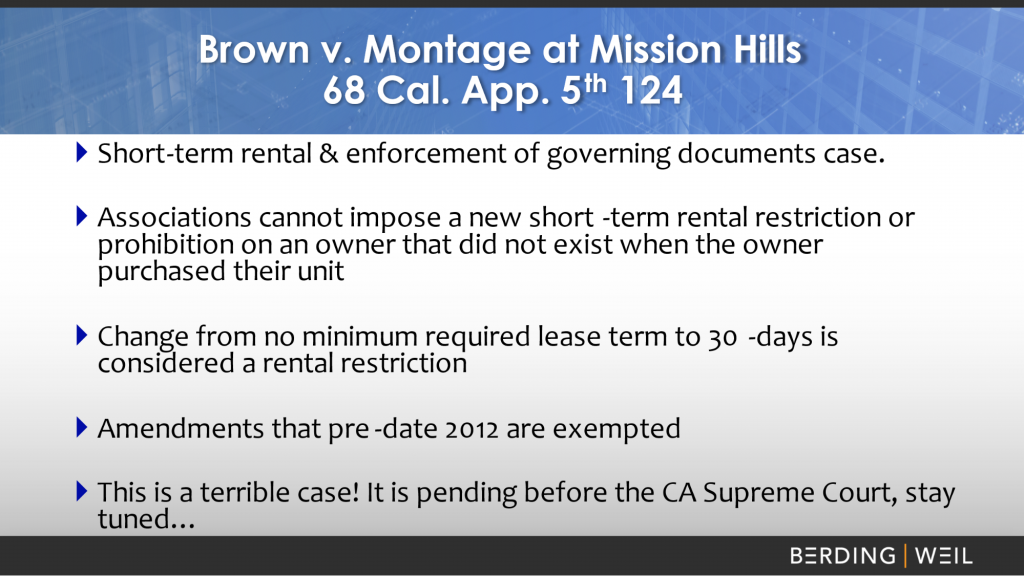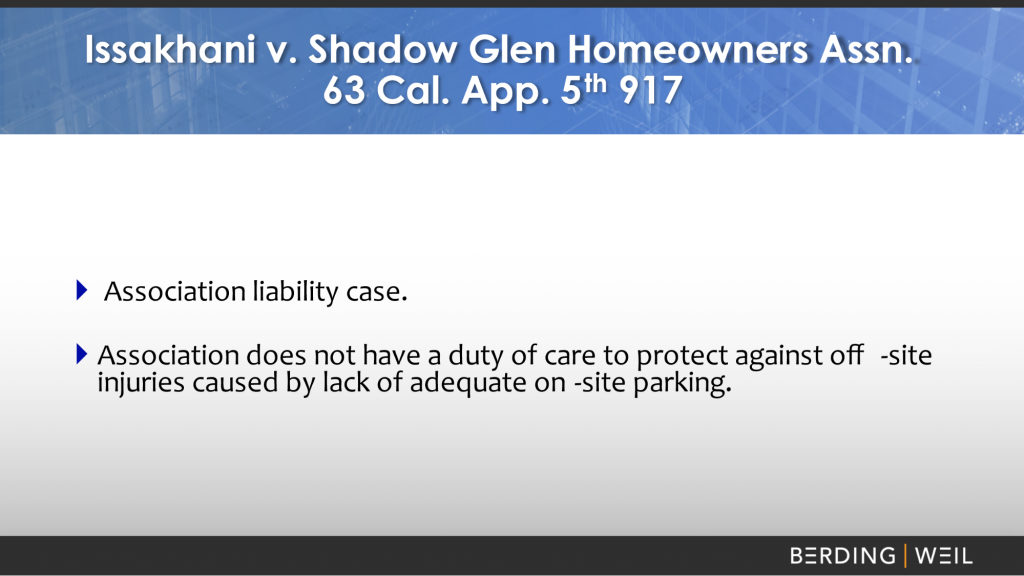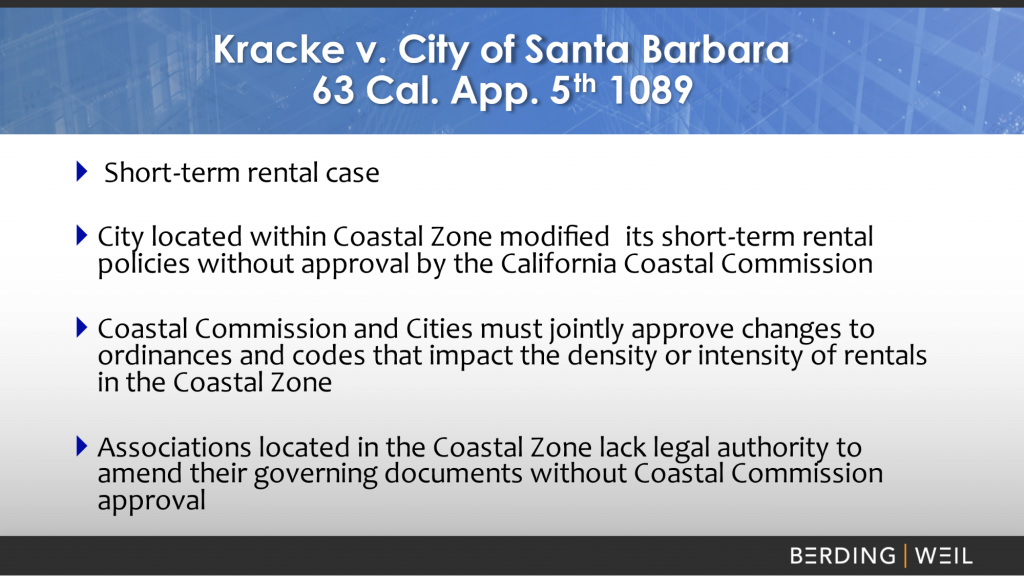Every year we can expect new HOA laws, just as sure as Summer and Winter come each year. As an HOA board member, it’s important to know and understand the changes in the laws and how they affect your association. Of, course you don’t need to become an attorney or go to law school, however doing a little research and/or speaking with an HOA lawyer, management company or some other reliable source can save your association “major” headaches and thousands of dollars, maybe even millions. According to Attorney Kelly G. Richardson, Esq. a Fellow of the College of Community Association Lawyers and Partner of Richardson Ober DeNichilo, 2021 was the most positive legislative year for California HOAs in a very long time.
Many HOA law firms provide an annual legislative update to association management companies, throughout the country. These updates include a review of the new changes in HOA laws and pending legislation affecting the industry, and the everchanging laws affecting HOAs. Here are some of the new HOA laws for 2022.

AB 502 Election by Acclamation
- Elections by acclamation are allowed in all sizes of communities;
- Amendment to Election Rules not required, but recommended;
- Standard elections required at least once every 3 years
- Specific and detailed notices required;
- Elections take 150 days now if election by acclamation to be used!
AB 1101 Financial Protections Clean-Up

- Association funds must be deposited in FDIC bank, guaranty corporation or credit union;
- No risky investments or stocks;
- Management must keep association funds separated now;
- Changes to large withdrawals from operating and reserve accounts;
- Changes to fidelity insurance requirements.
AB 1584 Board Amendments: Rental Restrictions Amends Civil Code 474 (f)
- Permits unilateral Board amendment to CC&Rs for rental restriction compliance;
- Extends compliance deadline to July 1, 2022;
- Establishes process for amendment that is similar to operating rule adoptions.
SB 9 Lot Splits

Lot splits are permitted… but are they?
- Uncertainty if common interest developments are exempted;
- Detailed criteria on requirements for split;
- Short-term rentals prohibited;
- Lot split or ADU/JADU, not both.
This law authorizes lot splits and construction of duplexes on lots. The law does not say whether it does or does not apply to common interest developments.
RECOMMENDATION: For any planned developments that do not want to allow lot splits, the Board should amend the CC&Rs to prohibit lot subdivision, if such a provision is not already included.
Generally, SB 9 allows for ministerial approval of either (1) a lot split to allow for 2 residential dwellings on the one lot, (2) to allow for a duplex on one single lot (so, lot isn’t split, just the housing is doubled), or (3) both! It could result in up to 4 residences on a single-residence lot. Ministerial = Building Department can simply approve at the plan desk. SB 9 also authorizes agencies to adopt ordinances to allow for things that were not directly authorized in the statute.
To the extent an association already has a provision in their CC&Rs that restricts further lot subdivisions, that could be a basis on which to disallow a lot split. To the extent an association does not have such a provision, but does wish to restrict lot splits, adoption of such an amendment could serve as a basis for the Board’s rejection of a lot split request. Again, associations should treat lightly because if litigated, a court could determine associations are nonetheless bound by the Government Code (because there’s nothing that expressly states they aren’t) and it could be a matter of time before the legislature expressly amends the Davis Stirling Act, like it did with ADUs, to force the issue.
SB 391 Remote Meeting

Amends Civil Code 4090 Adds Civil Code 5450
- Remote meetings allowed;
- Local, state, or federal emergency or disaster declaration required;
- Unsafe or impossible to meet;
- Individual notice required for first remote meeting;
- Modify agendas with specific Info on meeting access;
- Civil penalties for violations do apply.
SB 392 Changes to Notice & Delivery Requirements
Amends Civil Code secs. 4041,4045, 4055, 5220, 5230, 5260, and 5310 and 5220. Repeals and replaces sec. 4040 (effective 1/1/2023).
- Starting in 2023, owners must set communication preferences – email, mail or both;
- Associations to solicit owner preferences and other information before sending Annual Disclosure Statements;
- Statutory default for non-responsive owners is notice by mail;
- General Notice can now be accomplished through association websites;
- Changes to emails included in membership lists and owner record requests.
SB 432 Changes to Election Rules & Processes

- Confirms candidate and director disqualifications are limited to statutory bases only;
- Clarifies candidates and directors subject to same qualifications, statutory only;
- Only elections for directors and recalls must comply with the 30-day pre-ballot notice (5115(a));
- Updated the Corporations Code to mirror the Civil Code.
AB 1584 (Committee on Housing and Community)
This law helps correct a problem regarding the correction of illegal rental restrictions. Last year’s SB 3182 added Civil Code Section 4741, barring “unreasonable” restrictions against HOA rentals and requiring HOAs to amend their governing documents before 2022 to correct any unreasonable restrictions.
Many lawyers incorrectly told their clients that the law required HOAs to amend their CC&Rs although rules are also “governing documents.” This is expensive and often impossible due to member disinterest. AB 1584 opens a six-month window starting Jan. 1, 2023 and concluding July 1, 2023, in which HOA boards can amend CC&Rs without a membership vote solely to remove provisions violating Section 4741. This should not be attempted without competent legal advice.
Case Studies
Some of the cases involving these laws have helped to change the behavior of homeowners, and enlightened board members on important issues facing the community.
I. Brown vs. Montage

II. Issakhani v. Shadow Glen Homeowners Association

III. Kracke v. City of Santa Barbara

As a board member you have a fiduciary duty to your association, and fair knowledge of the changes in HOA laws can go a long way towards the peace and harmony in your community and possibly save you money.
Seeking to learn more about the ever-changing HOA laws?
Consider the advantages of hiring a professional HOA management company like AMC Inc. (Association Management Concepts). We’ll provide full-service board training and a complete break down the complex legal issues. Contact us at 916-565-8080 ext. 324.





